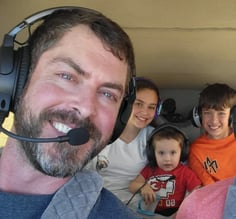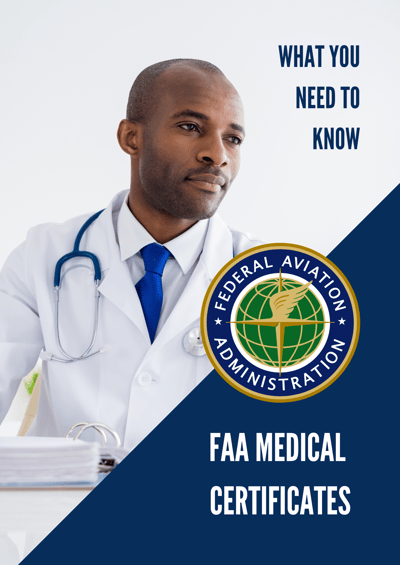Do you meet the FAA medical standards to get a pilots license? The FAA wants pilots to be healthy, and the way the FAA makes sure pilots are healthy is by conditioning their pilot licenses on a health check, called an FAA Medical Certificate. There are multiple types (classes) of medical certificates depending on the type of license. This article will explain all of the classes of medical certificates, and the medical standards and disqualifications for each and how to get your medical certificate. A medical certificate should be your first step whether you're a transitioning veteran, a new career pilot or switching from another career to aviation.
Need help with an FAA Medical Certificate?
 Dr. Bradley Harrison
Dr. Bradley Harrison
Kansas Aviation Medicine
We recommend Dr. Bradley Harrison and Kansas Aviation Medicine for all your FAA medical certificate needs. He's a former US Army doctor, is a Flex Air alumni, and can do remote consultations.
 The FAA airman medical certificates ensures that pilots meet the FAA's specific medical standards, Just like planes undergo routine maintenance checks, pilots are required to maintain their health to fly safely. Depending on the type of pilot's license you will need a different type of medical certificate, but any pilot (excluding glider pilots, free balloon pilots, and student pilots prior to solo), needs an FAA medical certificate. All FAA Medical Certificates are issued by an Aviation Medical Examiner (AME). An AME is a physician with special training from the FAA to conduct examinations for pilots and issue medical certificates
The FAA airman medical certificates ensures that pilots meet the FAA's specific medical standards, Just like planes undergo routine maintenance checks, pilots are required to maintain their health to fly safely. Depending on the type of pilot's license you will need a different type of medical certificate, but any pilot (excluding glider pilots, free balloon pilots, and student pilots prior to solo), needs an FAA medical certificate. All FAA Medical Certificates are issued by an Aviation Medical Examiner (AME). An AME is a physician with special training from the FAA to conduct examinations for pilots and issue medical certificates
This article is based onTitle 14 CFR part 67 (last amended 8/25/2023) and the FAA Synopsis of Medical Standards (last updated 12/28/2022), here are the standards that apply to ALL pilots requiring ANY qirman medical certificate:
FAA Certification Requirements for Med Certificate
Vision Standards (applies to all classes of med certificates):
- Near Vision (measured at 16 inches): 20/40 or better in each eye, with or without correction.
- Color Vision: Must be able to perceive colors necessary for safe airman duties. If you have a color deficiency in your vision see this guide.
Hearing Standards (applies to all classes of med certificates):
- Pilots must be able to hear an average conversational voice in a quiet room from 6 feet away with their back turned to the AME.
- Alternatively, pilots can pass an audiometric test. The criteria are:
- Audiometric speech discrimination test: Score 70% or more in one ear at a sound level of no more than 65 dB.
- Pure tone audiometric test: The thresholds are set for both the better and worse ear across different frequencies (500 Hz to 3,000 Hz).
Other General Standards (applies to all classes of med certificates):
-
ENT: No conditions that can cause vertigo, speech disturbances, or equilibrium issues.
-
Pulse: Used to determine the cardiac system's status and responsiveness, but there's no specific disqualifying pulse rate.
-
Blood Pressure: Though not explicitly stated, the current guideline for maximum value is 155/95.
-
Mental Health: Pilots should not have any diagnosis of psychosis, bipolar disorder, or severe personality disorders.
-
Substance Dependence and Abuse: Any history of "substance dependence" is disqualifying unless there's evidence of a 2-year recovery period with total abstinence. Substance abuse in the last 2 years is also disqualifying.
Disqualifying Medical Conditions for FAA Medical Certificates
An AME must deny or defer the certificate if the applicant has a history of various conditions, including but not limited to certain cardiac issues, epilepsy, substance dependence or abuse, and specific mental health disorders. Insulin dependent diabetics are generally disqualified, but you may get a waiver under certain conditions.
Specifically the following conditions are listed in the regulations as disqualifying medical conditions. In many cases, when the condition is managed and adequately controlled, the FAA will issue a contingent medical certification based on periodic reports.
- Angina pectoris
- Bipolar disease
- Cardiac valve replacement
- Coronary heart disease that has been treated or, if untreated, that has been symptomatic or clinically significant
- Diabetes mellitus requiring hypoglycemic medications
- Disturbance of consciousness without satisfactory explanation of cause
- Epilepsy
- Heart replacement
- Myocardial infarction
- Permanent cardiac pacemaker
- Personality disorder that is severe enough to have repeatedly manifested itself by overt acts
- Psychosis
- Substance abuse
- Substance dependence
- Transient loss of control of nervous system function(s) without satisfactory explanation of cause.
There are other conditions not specifically listed in the regulations which are also disqualifying. The FAA's Guide for Aviation Medical Examiners lays out exactly how the process works. If you are a veteran with a VA disability rating, check out our FAA Medical certificates with a VA Disability guide for information on how your VA disability can affect you FAA Medical Certificate.
Types of FAA Medical Certificates
The 3 major types of FAA medical certificates are outlined below including additional medical standards for each,
First-Class Medical Certificate
- What is it? The first-class medical certificate is the most stringent and is intended for airline transport pilots.
- Who needs it? Those aspiring to be or working as Airline Transport Pilots (ATPs) require this.
- Medical Standards:
- Distance Vision: 20/20 or better in each eye, with or without correction.
- Intermediate Vision (measured at 32 inches): 20/40 or better in each eye for those aged 50 and over, with or without correction.
- Near Vision (measured at 16 inches): 20/40 or better in each eye, with or without correction.
- Color Vision: Must be able to perceive colors necessary for safe airman duties. Color blind? See this guide.
- Hearing Standards: See above
-
Electrocardiogram (ECG): ECG required at age 35 and annually after age 40.
- Requirements and Privileges: It demands a thorough examination, including vision, hearing, and general medical standards. The privileges allow ATPs to fly large commercial jets, which often come with a higher salary and more rigorous flying schedules.
Second-Class Medical Certificate
- What is it? This certification level is a middle ground, designed primarily for commercial pilots who don't work for major airlines.
- Who needs it? Commercial pilots who engage in activities like banner towing, flight instruction, or agricultural flying typically require a second-class certificate.
- Medical Standards:
- Distance Vision: 20/20 or better in each eye, with or without correction.
- Intermediate Vision (measured at 32 inches): 20/40 or better in each eye for those aged 50 and over, with or without correction.
- Near Vision (measured at 16 inches): 20/40 or better in each eye, with or without correction.
- Color Vision: Must be able to perceive colors necessary for safe airman duties.
- Hearing Standards: See above
-
Electrocardiogram (ECG): Not routinely required.
-
Requirements and Privileges: While still rigorous, the medical standards are slightly less strict than the first-class certificate. It permits pilots to engage in commercial flying activities but not as an ATP for a major airline.
Third-Class Medical Certificate
- What is it? The third-class medical certificate is for those who fly for personal reasons and not commercially.
- Who needs it? Student pilots, recreational pilots, and private pilots typically require this certification.
- Medical Standards: See above for all class medical requirements.
- Requirements and Privileges: The medical requirements for the third-class certificate are more lenient compared to the first and second classes. It allows pilots to fly for personal and recreational purposes.
Basic Med
- What is it? BasicMed is an alternative to the traditional FAA medical certification process. It allows pilots to fly without holding an FAA medical certificate, as long as they meet certain requirements.
- Who can use it? To use BasicMed, pilots must have held a valid FAA medical certificate at any point after July 15, 2006. They should also not have been denied or had their medical certificate revoked.
- Benefits and Limitations: One major advantage of BasicMed is that pilots don't need to visit an Aviation Medical Examiner (AME). Instead, they can consult their primary care physician. However, there are operational limitations, like only flying in the US, below 18,000 feet, and in aircraft with 6 or fewer passengers.
How to get an FAA Medical Certificate
- Fill out the online application on MedXPress. This is the FAA's system for collecting and processing medical information from pilots. You will need to provide your personal information, medical history, medications, and any other relevant details. You will also need to choose an Aviation Medical Examiner (AME) who will conduct your physical exam.
- Schedule an appointment with your chosen AME. An AME is a doctor who is authorized by the FAA to perform medical exams for pilots. You can find a list of AMEs in your area on the FAA website. Make sure you bring your confirmation number from MedXPress, a valid photo ID, and any glasses or contact lenses you use for vision correction.
- Undergo the physical exam. The AME will check your vision, hearing, blood pressure, heart, lungs, abdomen, and mental status. They will also review your medical history and ask you about any conditions or medications that may affect your ability to fly. The exam usually takes about 30 minutes and costs around $100-$150. Some medical conditions can disqualify pilots, including certain cardiovascular diseases, neurological disorders, mental health conditions, and substance abuse issues. However, the FAA allows pilots to apply for a waiver known as a "Special Issuance" in certain circumstances.
- Receive your certificate or deferment. If you meet the FAA standards, the AME will issue you a medical certificate on the spot. If you do not meet the standards, the AME may defer your application to the FAA for further review. This may take several weeks or months and require additional tests or documentation.
- Keep your certificate current and updated. You must carry your medical certificate with you whenever you fly as a pilot. You must also report any changes in your health or medications to the FAA and your AME. If you develop a disqualifying condition or take a prohibited medication, you may lose your medical certificate and your flying privileges.
FAA Medical Certificate Renewal
Airman medical certificates expire after 6 - 60 months depending on the certificate holders age and class of the medical certificate.
- 1st Class (ATP): Must be renewed every 12 months for airman under age 40, and every 6 months for airmen over 40 years old.
- 2nd Class (Commercial Pilots): Must be renewed every 12 months
- 3rd Class (Private / Student / Recreational Pilots):
- Must be renewed every 5 years for airmen under 40 years old.
- Must be renewed every 2 years for airman over age 40.
FAA Medical Certificate FAQ
Q: What is an FAA medical certificate and why is it important for a pilot?
A: An FAA medical certificate is a document issued by the Federal Aviation Administration that certifies a pilot's physical and mental fitness to fly. It ensures that pilots meet the health standards necessary to safely operate an aircraft.
Q: How many types of FAA medical certificates are there and what are they?
A: There are three types of FAA medical certificates: First Class, Second Class, and Third Class. Each class has different medical standards and is required for different types of pilot certificates and operations.
Q: What does a first class medical certificate allow a pilot to do?
A: A first class medical certificate is required for pilots who wish to act as pilot in command of an airline transport pilot certificate. It also allows for other commercial operations, but it has the most stringent medical requirements.
Q: How long is a first class medical certificate valid?
A: A first class medical certificate is valid for 12 months if the pilot is under 40 years old. For pilots aged 40 and above, it is valid for 6 months. After that period, it may revert to a lower class medical certificate if the requirements are still met.
Q: What is the process to obtain an FAA medical certificate?
A: To obtain an FAA medical certificate, a pilot must schedule an FAA medical exam with an Aviation Medical Examiner (AME). The pilot needs to complete an application through FAA MedXPress before the exam, and the AME will conduct a comprehensive medical examination to assess the pilot's health.
Q: What happens if a pilot does not meet the requirements for a class medical certificate during the FAA medical exam?
A: If a pilot does not meet the requirements during the FAA medical exam, they may not be issued a medical certificate. However, they can apply for a special issuance authorization or undergo a medical flight test to potentially qualify under specific conditions.
Q: Can a pilot with a sport pilot certificate fly without an FAA medical certificate?
A: Yes, a pilot with a sport pilot certificate can fly without holding an FAA medical certificate. However, they must hold a valid U.S. driver's license as medical qualification and meet the health standards required for that license.
Q: What is the difference between a second class medical and a third class medical certificate?
A: A second class medical certificate is required for commercial pilots who do not need a first class medical. It is valid for 12 months regardless of age. A third class medical certificate is required for student, recreational, and private pilots. It is valid for 60 months if the pilot is under 40 and 24 months if over 40.
Q: Can a flight instructor hold a third class medical certificate?
A: Yes, a flight instructor can hold a third class medical certificate if they are not acting as pilot in command or required crew member. However, if they need to act as pilot in command, they must hold at least a third class medical certificate.
Q: How can a pilot maintain a current medical certificate?
A: A pilot can maintain a current medical certificate by regularly undergoing FAA medical exams as required for their specific class medical certificate. It is important to keep track of the expiration date and schedule exams accordingly to ensure they continually meet the necessary medical standards.

